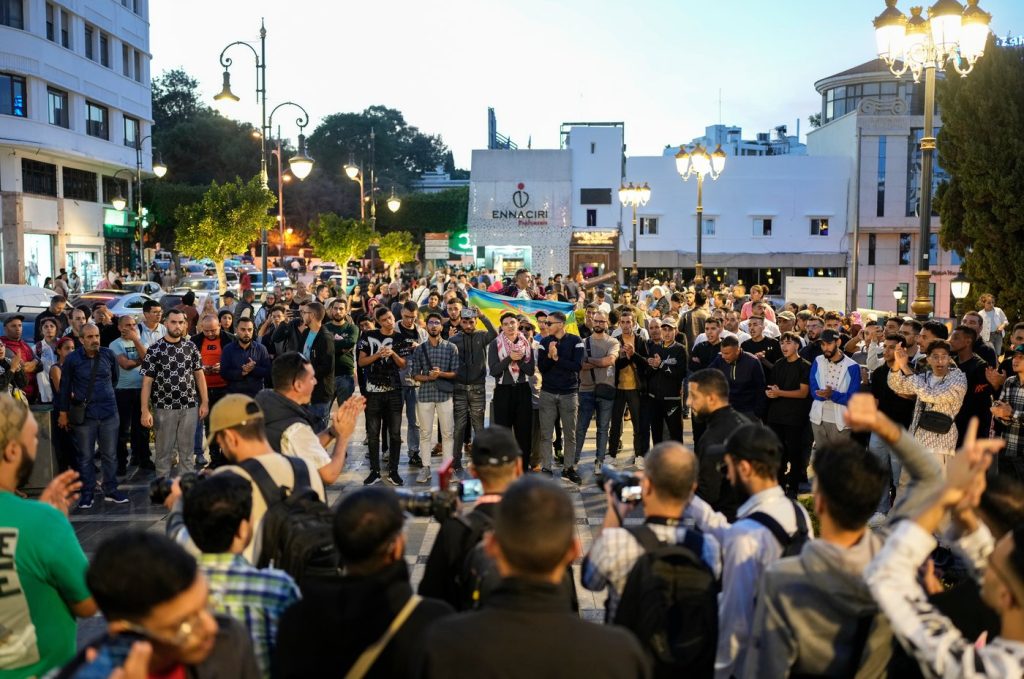CASABLANCA, Morocco (AP) – In a bid to highlight their grievances ahead of December's highly anticipated Africa Cup of Nations, young demonstrators in Morocco have called for a boycott of soccer matches at the nation’s newly constructed stadiums. This movement comes amid a backdrop of social unrest, with protesters demanding the release of fellow demonstrators arrested during earlier Gen Z 212 protests.
After an eight-day pause, hundreds of young protesters took to the streets on a recent Saturday to reaffirm their commitment to addressing issues such as corruption, inadequate healthcare, and substandard education. The protests were observed in multiple cities, including Casablanca and Tangier, where demonstrators expressed their dissatisfaction with elected officials, specifically targeting Prime Minister Aziz Akhannouch, whom they labeled as corrupt.
The demonstrations, although smaller in scale, followed a speech by King Mohammed VI delivered at Morocco's parliament, where he did not directly acknowledge the ongoing Gen Z 212 protests. His comments did not address the calls for Akhannouch's dismissal or the construction of stadiums for the 2030 FIFA World Cup. Instead, he suggested that national projects and social programs could progress simultaneously, stating, “There should be no contradiction or competition between major national projects and social programs, as both share the same goal: developing the country and improving the living conditions of citizens.” These comments were interpreted by many as a response to the protestors, who have criticized Morocco for favoring sports infrastructure over social and economic development.
Protesters chanted slogans such as, “Stadiums are here, but where are the hospitals?” and collectively called for a boycott of the upcoming Africa Cup of Nations, which Morocco is set to host in December. Many demonstrators chose not to reveal their identities due to fears of repercussions stemming from previous arrests during protests. Concerns about inequalities between public and private education were also voiced, with chants directed at politicians sending their children to private schools rather than the public institutions overseen by the government.
One protester shared their personal frustration, stating, “I’m done with school and studying, but I’m here demanding reforms for the generations to come,” highlighting the challenges faced in obtaining educational materials such as textbooks. The Gen Z 212 movement, which has gained traction primarily through social media platforms like Discord—with over 200,000 subscribers—organized protests in more than a dozen cities after an eight-day hiatus.
Education has emerged as a focal point for the protesters' demands, particularly concerning policies promoting private school enrollment. Since the year 2000, enrollment in private universities has surged more than sixfold, according to government data from 2024. However, state audits have revealed significant issues within the educational system, including teacher shortages, regional disparities, and transportation challenges, especially in rural areas lacking long-standing government support. Measures intended to enhance educational standards have failed to yield the expected improvements in school quality or student retention, as confirmed by government audits.
In response to the protest movement, politicians have committed to reallocating funds toward healthcare and education with the goal of driving advancements in these sectors. Finance Minister Nadia Fettah Alaoui mentioned at a World Bank meeting in Washington that prioritizing these allocations would be a key focus in the government's budget for the year.
The protests led by Gen Z in Morocco have drawn inspiration from similar movements worldwide, such as those in Nepal. The tragic deaths of eight women during childbirth in a public hospital in Agadir sparked widespread outrage that resonated throughout the nation. In some instances, these protests turned violent, leading to confrontations with police. Authorities reported three fatalities among individuals attempting to breach police posts, as well as numerous injuries and incidences of vandalism. Over 400 individuals across Morocco have been arrested in connection with the violent protests, with significant prison sentences being handed down to some defendants involved in vandalism.











